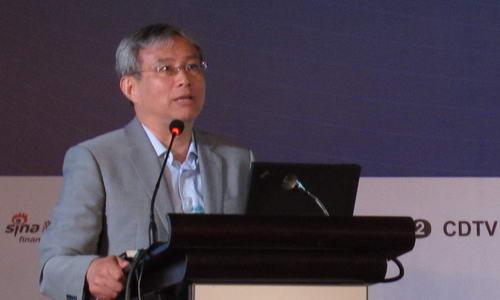The mechanism for establishing China's RMB exchange rate could be used to make the country's currency more market-oriented, and inflation might be eased with appreciation of the yuan, a leading Chinese economist told a financial forum in Beijing on Monday.

Zhou Qiren, a professor at Peking University, speaks at the economic forum, Integrating the World and Developing China, in Beijing on June 28, 2010. Zhou, 60, is also a member of the Monetary Policy Committee of the People's Bank of China, or the central bank. [Hao Yan / chinadaily.com.cn]
The central bank needs to achieve balance among various objectives, including inflationary challenges and international pressure, Zhou Qiren, a professor at Peking University, told chinadaily.com.cn following the economic forum. Policies need fine-tuning to better respond to the changing situation, said Zhou, 60, who also is a member of the Monetary Policy Committee of the People's Bank of China, or the central bank.
Zhou said the central bank should employ small changes in currency policies, assessing the effects and adjusting accordingly, step by step.
"For example, when the RMB maintains its current level in line with the US dollar, inflationary pressure might increase," he said.
Zhou said reform of the yuan exchange rate mechanism could boost currency supply and demand in the marketplace, and also reflect a more dynamic market.
He said the government needs a stable currency for policy adjustment, adding that such an approach is more difficult when the RMB fluctuates against the US dollar.
"China is seizing its own fate, instead of relying on another economy," Zhou said, adding that China no longer sees a reason to bind its currency to that of the United States.
The new mechanism pegs yuan on several foreign currencies, rather than just the US dollar, especially when the US economy is in trouble.
Zhou suggested a more efficient use of interest rate leverage, since deposit and loan interest rates are still under strict control.





